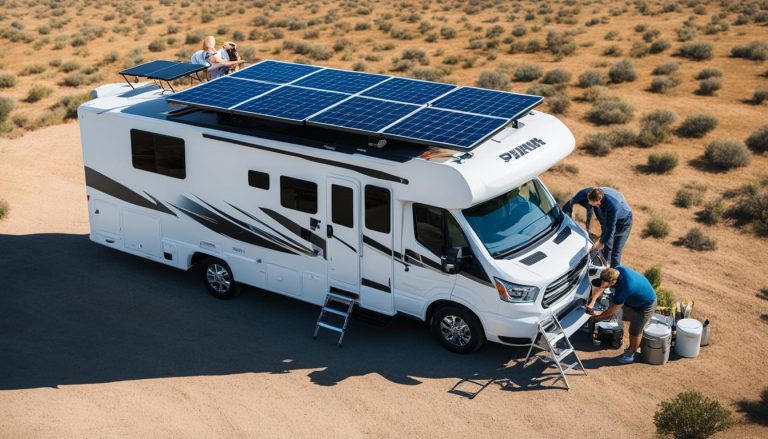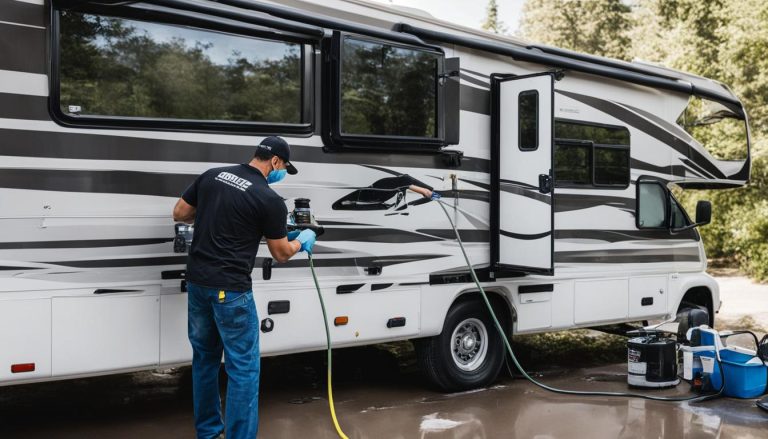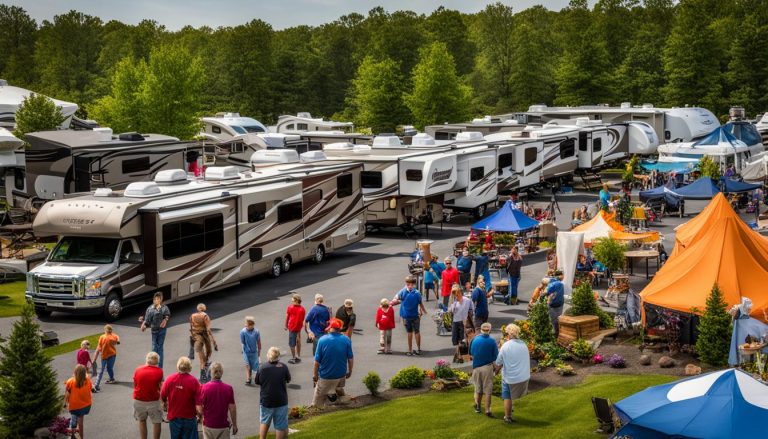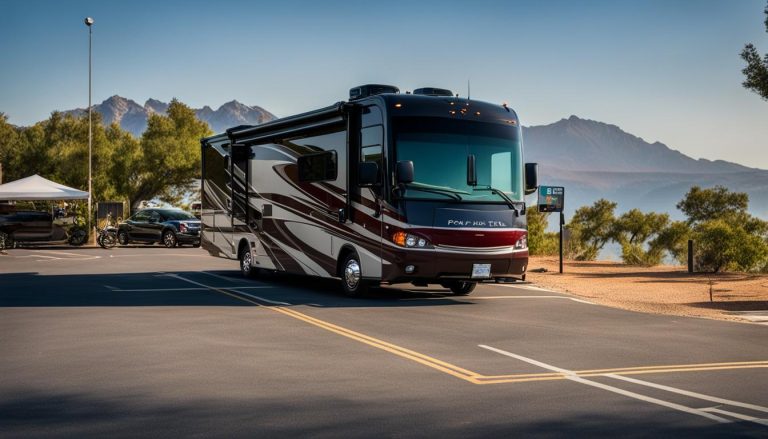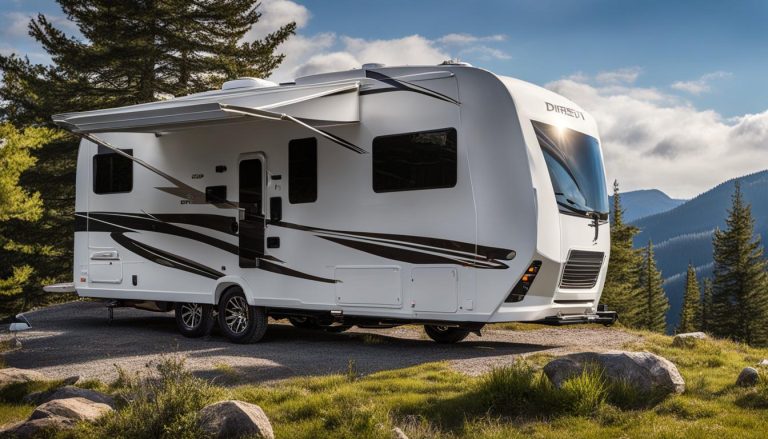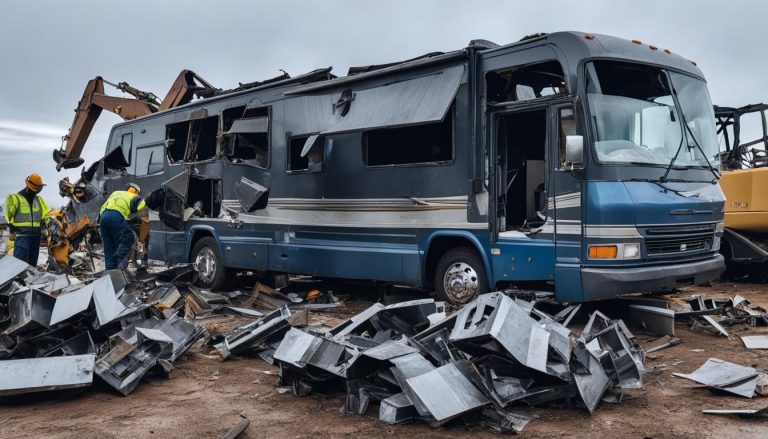Stay Connected: How to Get Internet for RV
gorvlifestyle.com and its partners may earn a commission if you purchase a product through one of our links
With the right setup and gear, you can have internet access almost anywhere in your RV. Whether you’re a digital nomad, a weekend warrior, or simply want to stay connected while on the road, having reliable internet in your RV is crucial. In this article, we’ll explore the options and solutions available for getting internet in your RV, so you can choose the best internet setup for your needs.
Key Takeaways:
- There are two primary options for getting internet in an RV: using cellular data or connecting to a local WiFi network.
- The level of connectivity you need will depend on your internet usage while on the road.
- Consider factors such as campground WiFi availability, data plans, and hardware to choose the right RV internet solution.
- Pros and cons of RV WiFi and cellular data should be weighed before making a decision.
- Additional tips and accessories can optimize your RV internet setup for a better connection.
RV Internet Options: Cellular Data or Local WiFi
When it comes to setting up internet in your RV, you have two primary options: using cellular data or connecting to a local WiFi network. Each option has its own benefits and considerations, depending on your specific needs and preferences.
Using Cellular Data
If you choose to use cellular data, you will need a mobile hotspot device or the ability to tether your phone to create a WiFi network. This allows you to access the internet using your cellular data plan, similar to how you would connect to the internet on your smartphone. Cellular data can provide reliable internet access almost anywhere, as long as you have a cellular signal.
Considerations for using cellular data:
- Choose a reliable cellular provider with good coverage in the areas you plan to travel.
- Check the data plans offered by RV internet providers to ensure they meet your internet usage needs.
- Invest in hardware such as boosters, routers, and hotspots to enhance your internet connection.
Connecting to a Local WiFi Network
If you prefer to connect to a local WiFi network, you will need a WiFi extender or repeater to boost the campground WiFi signal inside your RV. This can be advantageous if you plan to stay at campgrounds with reliable WiFi access. A WiFi extender or repeater amplifies the WiFi signal and extends its range, ensuring a stronger connection inside your RV.
Considerations for connecting to a local WiFi network:
- Research the WiFi availability and quality at the campgrounds you plan to visit.
- Invest in a WiFi extender or repeater to boost the campground WiFi signal.
- Ensure you have the necessary hardware, such as routers and hotspots, to optimize your WiFi setup.
Both options have their advantages and considerations, so it’s important to evaluate your internet needs, the reliability of WiFi at your desired campgrounds, and the availability of cellular signal in the areas you plan to travel. By choosing the right RV internet setup and hardware, you can ensure a stable and fast internet connection while on the road.
Considerations for Choosing the Right RV Internet Solution
When it comes to selecting the right RV internet solution, it’s crucial to assess your specific needs and circumstances. Considering essential factors can help you make an informed decision that caters to your unique requirements.
Internet Usage
Start by determining how you will use the internet while on the road. If your internet needs are limited to basic tasks like checking email and staying connected on social media, simpler options such as campground WiFi or a mobile hotspot might suffice. However, if you rely heavily on a stable and high-speed connection for activities like remote work, video streaming, or online gaming, you will need a more advanced setup, including cellular data and possibly a WiFi extender.
Camping Style
Your camping style can also influence your internet needs. If you primarily stay at campgrounds with reliable WiFi, a less robust setup may be suitable. However, if you enjoy boondocking in remote locations where WiFi may be scarce, you’ll require a more comprehensive internet solution to ensure uninterrupted connectivity.
Data Requirements
Considering your monthly data usage is crucial when choosing an RV internet solution. Heavy internet usage, such as frequent video streaming and file uploads, may warrant an unlimited data plan to avoid costly overage charges and data throttling. Assess your usage patterns and choose a plan that aligns with your data requirements.
| Factors | Considerations |
|---|---|
| Internet Usage | Determine the level of internet access required for your specific activities. |
| Camping Style | Assess whether you primarily camp in areas with reliable WiFi or remote locations. |
| Data Requirements | Evaluate your monthly data usage to select an appropriate plan. |
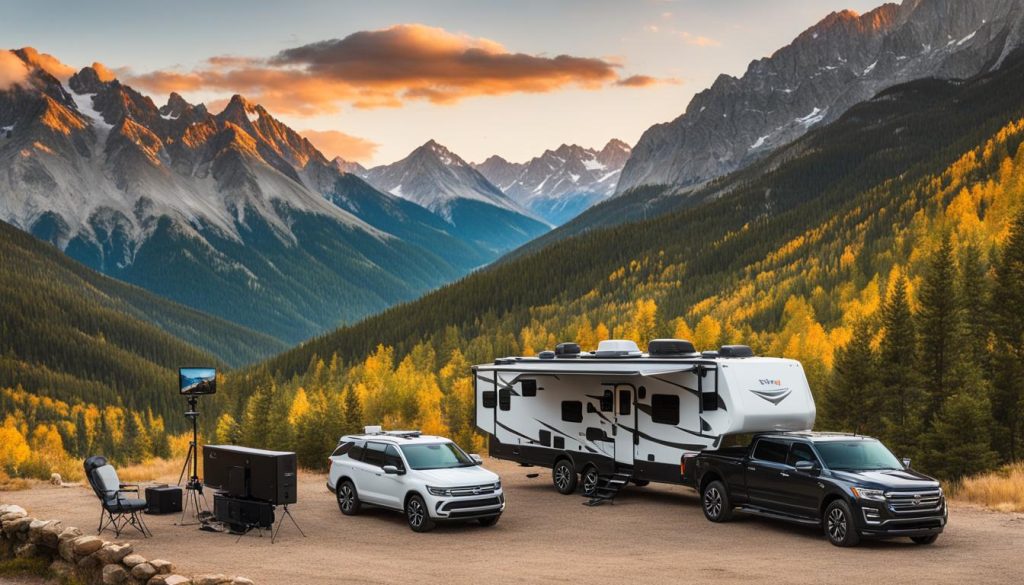
By considering these factors, you can choose an RV internet solution that adequately meets your needs, ensuring a seamless and enjoyable online experience while exploring the great outdoors.
Pros and Cons of RV WiFi and Cellular Data
When it comes to getting internet for your RV, there are two main options to consider: campground WiFi and cellular data. Each option has its own set of pros and cons, so let’s take a closer look.
Pros and Cons of Campground WiFi
Pros:
- Convenience: Campground WiFi is often included in your camping fees, making it a convenient and cost-effective option.
- Easy access: You can connect to the WiFi network without the need for additional equipment.
Cons:
- Inconsistent signal strength: The quality of campground WiFi can vary, and you may experience slow speeds or intermittent connections.
- Not suitable for heavy internet use: Campground WiFi may not be reliable for tasks that require a stable and fast internet connection, such as streaming videos or working remotely.
Pros and Cons of Cellular Data
Pros:
- Flexibility: Cellular data allows you to access the internet almost anywhere, giving you the freedom to stay connected even in remote locations.
- Potentially faster and more reliable: If you have a good signal and a reliable cellular provider, the speed and reliability of cellular data can surpass that of campground WiFi.
Cons:
- Data limitations and additional costs: Depending on your data plan, you may have limited monthly data allowances or incur additional charges for exceeding your limits.
- Signal strength can vary: Cellular signal strength can be affected by your location and the number of users on the network, resulting in slower speeds or weaker connections.
To improve the WiFi signal in your RV, you can consider using a WiFi extender or repeater. This device boosts the campground WiFi signal, increasing its range and improving the signal strength inside your vehicle. On the other hand, a cellular booster enhances the signal strength and speed of your cellular data connection, providing a better internet experience while on the road.

Additional Tips and Accessories for RV Internet Setup
When it comes to optimizing your RV internet setup, there are a few additional tips and accessories that can enhance your connectivity. First and foremost, it’s essential to conduct a speed test to determine the actual speed of your internet connection. This will give you insight into whether you have sufficient speed for your internet needs.
To navigate the world of RV internet terminology, familiarize yourself with terms like hotspots, boosters, repeaters, and routers. Understanding these components and their functions will help you make informed decisions about your setup.
Investing in a WiFi extender can significantly improve the range and strength of your campground WiFi signal. This means a more reliable connection throughout your RV. Additionally, consider a cellular booster to enhance your cellular data signal, ensuring better connectivity even in areas with weaker reception.
Choosing the right data plan is also crucial. If you use a lot of data, consider unlimited options to avoid overage charges and restrictions. Finally, always have a backup plan in place, such as a mobile hotspot or access to public WiFi, should your primary internet source become unavailable.
FAQ
What are the options for getting internet in an RV?
The two primary options for getting internet in an RV are using cellular data from a provider or connecting to a local WiFi network.
How do I use cellular data for RV internet?
You can use a mobile hotspot device or tether your phone to create a WiFi network and access the internet using your cellular data plan.
How do I connect to a local WiFi network in my RV?
To connect to a local WiFi network, you will need a WiFi extender or repeater to boost the campground WiFi signal inside your RV.
Are there data plans specifically for RVers?
Yes, there are various providers that offer data plans specifically for RVers, allowing you to have a reliable and convenient internet experience while on the road.
What hardware do I need for RV internet?
Depending on your setup, you may need boosters, routers, hotspots, WiFi extenders, or cellular boosters to enhance your internet connection in your RV.
How do I choose the right RV internet solution?
Consider your internet needs, camping style, and data usage to determine if campground WiFi or cellular data is the right option for you. Additionally, research and invest in the necessary hardware for a reliable connection.
What are the pros and cons of campground WiFi?
Campground WiFi can be convenient and cost-effective, but the signal strength and speed may vary, making it less reliable for heavy internet use.
What are the pros and cons of using cellular data?
Cellular data provides more flexibility and can be faster and more reliable, but it may come with data limitations, additional costs, and signal strength can be affected by location and network usage.
How can I improve my WiFi signal in my RV?
You can use a WiFi extender or repeater to boost the campground WiFi signal inside your RV for a stronger and more reliable connection.
What are some additional tips for optimizing my RV internet setup?
Conduct a speed test to determine your actual internet speed, invest in the right accessories like boosters and extenders, choose the right data plan, and have a backup plan in case your primary internet source is not available.

